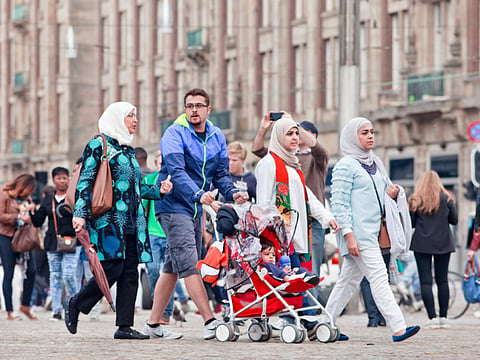UAE to host world conference on Muslim minorities
Some 400 leaders from 130 countries to review experiences and challenges faced by them outside the Islamic world

Abu Dhabi: An international conference is set to be held in Abu Dhabi in May to address challenges and opportunities of around 500 million Muslims working and living outside the Islamic world.
The conference will also explore ways for them to fulfil their role as both good Muslims and good citizens and encourage positive contribution within the society, organisers said on Wednesday.
“The International Conference on Muslim Minorities: Opportunities and Challenges, to be held on May 8-9, aims at spreading the culture of peace and tolerance between adherents of religions and cultures, and contributing to safeguarding the children of Muslim minorities against violence and extremism and defending the rights of these religious and cultural minorities according to international conventions and treaties,” said Dr Ali Rashid Al Nuaimi, chairman of the Supreme Committee of the conference.
Dr Al Nuaimi said the event is very important and has a global dimension and comes within the framework of the initiatives sponsored by the UAE that serve all humanity.
“The world now lives in the context of globalisation in many aspects and the resulting human mobility between different continents and societies,” Dr Al Nuaimi told a press conference in Abu Dhabi.
He pointed out that “each country has its own environment that is different from the other challenges faced, and some Muslim minorities went to other worlds and achieved successes, became an essential component and contributed to the development of the countries in which they live”.
At the same time, “other minorities have faced challenges, and some have not been able to effectively integrate into their new societies”, Dr Al Nuaimi explained.
The conference will bring together more than 400 leaders of Muslim minorities in more than 130 countries to review their experiences and challenges.
On the objectives of the conference, Dr Al Nuaimi said it will discuss setting a framework that will help Muslim minorities to play their active role in serving their countries and to highlight the bright image of Islam.
He stressed that the conference is an opportunity to find an incubator to study the challenges that Muslim minorities have faced over the years in order to make a difference that serves the future generations of these minorities and highlight the successful models.
“The event is unique as it is the first time in the history of Muslim minorities to meet in a single conference to discuss their issues and interact with each other,” said Dr Mohammad Bashary, member of the Supreme Committee of the conference and secretary-general of the European Islamic Conference.
He added that the conference will discuss the development of a strategy to immunise the Muslims outside the Islamic world from falling into the trap of radicalisation, and how a Muslim becomes a good citizen in his community.
Main agenda
The World Conference on Muslim Minorities aims to improve the functioning of Islamic institutions in the world to play the role of intellectual and spiritual security for Muslim minorities and to encourage them to engage in building their societies and participate in their civil and cultural initiatives.
The conference seeks to achieve the civilisational existence of Muslim minorities through positive interaction with the rest of their societies, in addition to launching initiatives to combat extremism and hatred of the other, as well as strengthening the system of citizenship and social integration of these minorities.
The conference will discuss several issues, including the situation of Muslim minorities in the global context: opportunities and challenges, the growing phenomenon of religious extremism and Islamophobia, and their role in undermining social integration strategies and their impact on community peace.
The conference will also examine the role of Muslim minorities in promoting cultural pluralism in the societies in which they live, through the creation of a cultural discourse based on the basic principles of community security, recognition of the other, and the principle of cultural pluralism as a guarantee of privacy within the concept of citizenship.
The conference is expected to witness the participation of Islamic federations, organisations and centres in countries outside the Organisation of Islamic Cooperation (OIC), Islamic institutions in the Islamic world, and international institutions with an interest in the issues of Muslim minorities and academics.
Sign up for the Daily Briefing
Get the latest news and updates straight to your inbox



